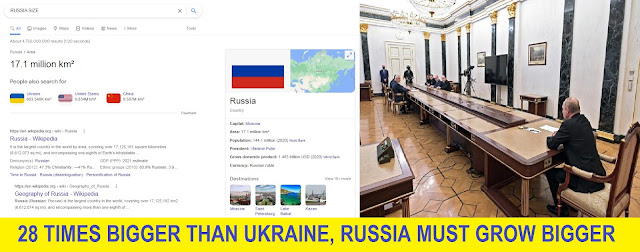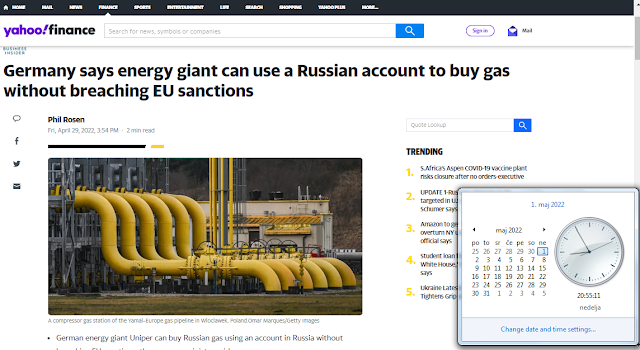Russia Nearly Doubled Its Income From Energy Sales To The EU During Wartime, Study Shows
Moscow continues to benefit from Europe's energy dependence on Russian oil despite a reduction in sales due to sanctions imposed to pressure it to end its war against Ukraine, according to experts with a Finland-based research organization.
New research by the Center for Research on Energy and Clean Air (CREA) released on April 28 shows that Russia has nearly doubled its revenues from sales of fossil fuels to the EU during the two months of war in Ukraine.
Soaring prices have more than compensated Russia for the loss in sales volume due to sanctions, the research shows.
Researchers at CREA also say new sanctions promise to drive up prices even more, nullifying efforts to prevent Russian President Vladimir Putin from using energy to pressure the EU and to finance the war against Ukraine.
Since the start of the war, Russia has sold 46 billion euros worth of energy resources to the European Union, and the figure continues to rise. This is about twice as much as the amount of sales in the same period in 2021,according to CREA.
Even though there was a decline in the volume of sales, the increase in the price of oil brought Moscow about 63 billion euros ($66 billion) on the energy exported on ships and through pipelines since the invasion was launched on February 24.
According to CREA, the volume of Russian oil imported by the EU fell by 20 percent and coal by 40 percent. However, gas imports grew, and Germany remains the main buyer. During the two months of the war, it imported energy products worth 9 billion euros.
Lauri Millivirta, lead analyst at CREA, said the continued export of energy "is a big hole in the sanctions" and all countries that buy fuel from Russia "become complicit in the monstrous violations of international law committed by the Russian military."
The only way to stop the war would be a quick and complete rejection of Russian energy carriers, she believes.
The European Parliament in March adopted a resolution calling for an embargo on Russian energy, but so far the European Union has only discussed such an embargo. The EU has imposed an embargo on Russian coal that will take effect from August.
The German government has ruled out a gas embargo because of the economic damage it would cause, but Chancellor Olaf Scholz said on April 28 that Germany must prepare for Russia to suspend gas deliveries.
"Whether and what decision the Russian government will make in this regard is speculation, but...one has to prepare for it," Scholz said during a visit to Tokyo. The German government already has started preparing for the possibility that Russia will cut off gas supplies, he added.
The CREA research was reported as Russian energy giant Gazprom announced a soaring net profit for last year, citing high energy prices as the main reason for the increase.
Gazprom said in a statement that its net profit hit 2.09 trillion rubles ($29 billion) in 2021, up from 135 billion rubles the year before when profits slumped due to the global pandemic and falling energy prices.
"The main factor that affected the financial result was an increase in gas and oil prices," the state-controlled company said in a statement.
Global energy prices have soared since last year as economies began emerging from COVID-19 pandemic lockdowns. Prices have risen further in the wake of Russia's military operation in Ukraine.
Gazprom also forecast a fall in gas output of about 4 percent this year in another sign of the impact of Western sanctions against Moscow.
Gazprom on April 27 announced the halt of gas supplies to EU members Poland and Bulgaria, saying they had violated Putin's order that payments for gas be made in rubles.
Putin made the demand in retaliation for the West's economic sanctions against Moscow over the Ukraine conflict.
Although the sanctions had led to an increased level of economic uncertainty in Russia, Gazprom said the situation did not "call into question the consistency" of its operations.
German energy giant Uniper can buy Russian gas using an account in Russia without breaching EU sanctions, the economy ministry said.
Russia has demanded gas customers to create two accounts, one in rubles and one in foreign currency, with Gazprombank.
The Financial Times reported earlier that Uniper is preparing to open Russian accounts to pay for gas.
German energy giant Uniper wouldn't violate European Union sanctions if it opened an account in Russia to pay for gas, according to a German economy ministry spokesperson.
"For us, the account number doesn't matter, or the question of whether one or two accounts are opened in one place," spokesman Stephan Haufe said at a news conference Friday.
He noted that the most important thing is whether the transaction is completed in euros and dollars, as per the gas contracts.
President Vladimir Putin has demanded that Russian gas purchases are completed in rubles, and that buyers set up two accounts with Gazprombank to facilitate the transaction. Buyers that do not comply will have their supplies cut off, according to the decree.
On Thursday, the Financial Times reported that Uniper is among European energy companies that are preparing to register for a new payment mechanism that facilitates ruble payments.
The EU has said nations participating in Putin's currency conversion mechanism — opening a ruble account, specifically —would breach sanctions.
But the EU's guidance has also created room for confusion. Uniper said it's aiming to pay for Russian gas in euros in an account in Russia rather than in Europe, which the European Commission said could be allowed.
Still, Slovakian officials pointed out that an EU sanction breach could still occur, as Gazprombank automatically opens new euro and ruble accounts for European buyers, which then demands consent for Russia's central bank to convert the currencies.
Germany to support Russian oil embargo: sources
EU leaders are expected to present the proposed embargo later this week. Supporting the measure would be Germany's second turnaround in as many weeks with regards to Ukraine.
The European Union is planning a new raft of sanctions against Russia, Brussels insiders told reporters on Sunday. These new penalties are likely to include a bloc-wide embargo of Russian oil.
This measure has for weeks been seen as key to truly crippling the coffers of Russian President Vladimir Putin's war machine, but it has been stymied by foot-dragging from several EU member states — including Germany.
But now, government sources have told German news agency dpa that the administration of Chancellor Olaf Scholz is finally ready to throw its support behind the oil ban.
The about-face would be Scholz's second in as many weeks, after Germany announced that it would send tanks to Ukraine following more than a month of declining to do so amid international pressure.
According to Economy Minister Robert Habeck, Germany has managed to reduce its dependence on Russian oil by a huge margin in just eight weeks. Before Russia's invasion of Ukraine began in late February, Germany relied on Russia for 35% of its energy needs. Now, Habeck said, that has dropped to just 12%.
Should Berlin reverse course, that leaves Italy, Austria, Hungary, Slovakia, Spain and Greece as the holdouts who have yet to publicly support an embargo. Of these, Hungary is seen as the most likely to maintain a strong opposition.
Although the EU had already agreed to stop importing Russian coal, countries that border Ukraine or Russia, like Poland and the Baltic States, have been calling for an oil ban as well.
The oil embargo is likely to be put on the table on Wednesday during an ambassadors summit in Brussels, according to French news agency AFP.


















No comments:
Post a Comment